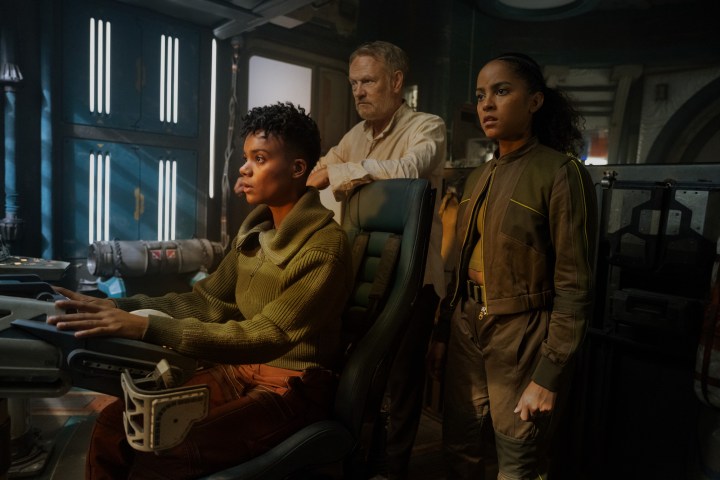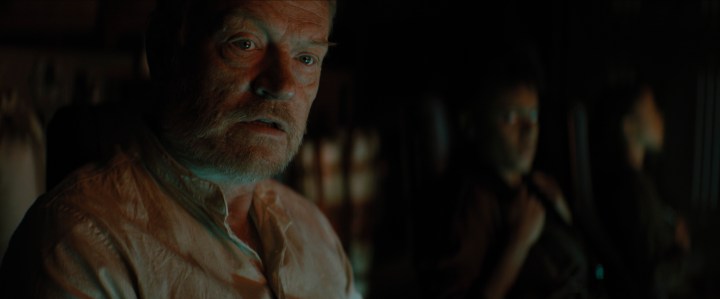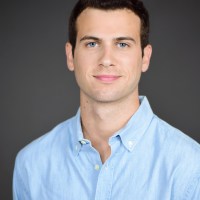David S. Goyer told his writers before starting work on season 2 of Foundation that “the training wheels are off.” Foundation, the sci-fi drama co-created by Goyer and Josh Friedman that’s based on Isaac Asimov’s book series, returns to Apple TV+ for its second season on July 14. With so much exposition and worldbuilding in season 1, Goyer, the showrunner on Foundation, and his team were happy to “dive right in and start the story” to begin season 2.
It has been two years since the season 1 finale, but more than a century has passed in the series’ timeline. The impending Second Crisis is on the horizon, with the galaxy’s fate in the hands of “crucial individuals” that transcend time and space. Foundation stars Jared Harris as Hari Seldon, Lee Pace as Brother Day, Lou Llobell as Gaal Dornick, Leah Harvey as Salvor Hardin, Laura Birn as Demerzel, Terrence Mann as Brother Dusk, and Cassian Bilton as Brother Dawn.
In conversation with Digital Trends, Goyer and the cast discussed Foundation season 2 and how the series remains as visually stunning and ambitious as ever.

Note: This interview has been edited for length and clarity.
Digital Trends: You are now two seasons into your eight-season pitch. How do you feel it has been going?
David S. Goyer: So far, so good. I mean, we literally just put the finishing touches on season 2 about four weeks ago. I was really proud of what we accomplished with season 1. My ambition for season 2 was to be even more ambitious, but primarily, to dig even deeper into the story, the emotions, [and] the characters, and hopefully broaden our audience. That was really what I was focused on for season 2. As far as I am concerned . . . I feel like we topped ourselves from season 1, so I’m really happy with that. It just makes it even harder moving forward.
You had to do a lot of that groundwork in the first season. Do you feel like you could get right into season 2? Like, take the training wheels off and say, “OK. We have this world established. Let’s get right into it.”
Goyer: Well, it’s interesting that you use the phrase “take the training wheels off” because I actually used that exact same phrase with my writers. Season 1 necessarily had a lot of expositional pipes that we had to lay — introducing the world at large to the concept of psychohistory, what this kind of galactic empire meant, and how was it different than something that you might have seen in Star Wars. The concept of the genetic dynasty is, just in and of itself, a mind-bending concept.
The concept of the Foundation . . . we didn’t have to do any of that with season 2. All of that already existed, which meant with episode 1 of season 2, we could just dive right in and start the story. I’m not even sure people need to have seen season 1 to enjoy season 2, which was somewhat by design. It was just kind of liberating. I remember, to a certain extent, that’s also how I felt when I saw like the second season of Game of Thrones or something like that. When you’re dealing with these big, giant shows, there’s always going to be some table-setting.

The worldbuilding continues to be so impressive and ambitious. Is there a memorable location from season 2 that sticks out?
Jared Harris: We were really lucky. We got to explore the Canary Islands and all of the wonderful possibilities that those islands have. They really are remarkable in that they are each so distinct and different. Do I have a favorite location? I think my favorite location was somewhere that we ended up not being able to film in because it was too dangerous.
Laura Birn: Oh, my God. There are so many. We’ve been through amazing experiences in this show. We started shooting before the pandemic, and then we did a break during COVID. Then we went back, but it was kind of still very empty. People weren’t traveling, so we were kind of just by ourselves. It felt like no one else was there. In the Canary Islands, in the middle of nowhere, it actually felt like being on a remote planet somewhere. The wind blowing in our hair.
Lee Pace: It’s true. You put on the costumes, and then you play the scenes, and you really get this …
Birn: You wouldn’t see anyone with their shorts and sandals going on a holiday. But it felt like we were actually living that life.
Pace: Yeah. We’re actually there.
Birn: Also, Ireland was amazing and so beautiful. We went to Malta. We’ve been to beautiful places. Amazing sets.
You can tell when you’re shooting on location and not in front of a blue or green screen. It comes through in the product.
Birn: And I think it helps us also to be in the environment. You kind of like have it all around you, so you don’t need to imagine everything.
Pace Yeah. One of the fun scenes that I remember is we shot at the opera house [on the Spanish island of] Tenerife, which is this really surreal piece of architecture. And to be there shooting a big scene, like lots of stuff happening, we had a whole week to shoot this massive, massive scene. To have the wind and the sun and all of those a part of it, now we see it cut together, and it’s positioned up high [with] the palace in such an extraordinary way. All the layers behind this filmmaking are very cinematic and fun.
How did you approach playing two versions of the character Hari? They have distinct personalities.
Harris: Well, that was the goal, to create that and essentially allow their experience to shape the way that their personalities come across. They’re shaped by their experiences. [For] one of them, nothing is going right.
You spend a lot of time with Gaal in season 1, and now that duo becomes a trio with Salvor. They form this complicated team. What can you tease about that trio for the upcoming episodes?
Harris: Well, Salvor goes to find Gaal at the end of season 1, and Hari’s taken along for the ride, unbeknownst to him. They form a sort of strange, dysfunctional family for a while in that way that’s very appropriate of families. You use the intermediary to talk to somebody to try to resolve an issue that you have with somebody else, which is the sort of way that families tend to function, so there’s that dynamic created between the three of them because they’ve all got an issue with each other in some way.
Lee, with your character from season 1 to season 2, there is definitely this shift where he feels more human than ever, like a man with flaws and feelings. How did you approach that character change for this season?
Pace: I feel like even though they’re not the same man, they’re, very, very different. They’re in the same kind of situation. I guess I wanted to grab hold of the opportunity to embrace those differences and embrace a different way of thinking. Whereas the first one believes he’s one of the clones and has got the inkling that maybe I’m actually a human, too. Maybe, I’m separate. Maybe, I’ve got my own beliefs. Maybe, I have control of my destiny.
With this Cleon, I guess I wanted him to revel in that, to let his ego explode inside that sense of “I can do it all. I am it all.” I’m not just one of the Cleons. I’m the Great [Day]. I will fulfill this role in front of me, and I will write my own destiny. I’ve got sentience. I’ve got individuality, and I claim it. I thought that was exciting. I was actually really intrigued. The more I stepped into those shoes, the more vulnerable the character felt to me, the more he felt at odds with the situations he was in, and the more he had to fight.
Laura, how did you approach coming into this season with more conflict for your character?
Birn: Well, I think this season for me was very special because, as Lee said, with the emperor, the bigger their ego gets and bolder their ideas get, she has to fight harder to protect the genetic dynasty.
Pace: [Laughs] No, it’s true.
Birn: [Laughs] She works hard! Big-time. Yeah, the ego is not small. It’s like a huge ego, and the ideas are crazy. We see a harder side of her. Also, she plays a game with tough decisions. But then we get to see the more vulnerable side of her when we study her backstory. We understand the horrible things she’s been through and the way he [Day] possesses her. [He] kind of enslaves her. Even though there is a lot of love in that decision, he thinks that love is so blinded by his ego already.
The pain that she carries with her. Yet, she’s a very functional robot. She will not let go of her duty, and she will execute her mission. But at the same time, there’s the whole pain. There is love also. I truly believe that she cares for the Cleons. I believe that she actually loved the different versions of Cleon I, the little boy that became her first friend when she was living in her dungeon. Then, the emperor. Then, the old man gave her a beautiful gift at the time: a moment of freedom. He gave her a moment of freedom, but then also stole her freedom. We get to see a whole scope of her.

One of the opening scenes of season 2 is with Hari in the Prime Radiant. It reminded me of a house of mirrors you see at a carnival, except on steroids. Can you talk about the design of the Prime Radiant and how you ended up shooting it?
Goyer: I remember I directed two episodes in season 2, but I very deliberately did not want to direct episode 1 because of those scenes [laughs] because I thought they would be such a pain in the ass to realize. I had Alex Graves, our producing director, handle that. There were four different sets that comprised different elements of the Prime Radiant, and they were real head-scratchers. Each of them involved various prisms and reflections and things like that. Some of them involved sets that turned where Jared was on a wire, sort of like what they did in Singing in the Rain. You know, those old tricks.
We had sets that rotated, and we had to build miniature versions of each of the sets in order to work out how the hell to actually do all of these things. It was incredibly complicated. Then, what we had to do in post was erase the crew from the various reflections and erase the smudge marks from people’s fingerprints or things like that in the shots. Those sequences in the Prime Radiant were certainly the most sophisticated thing that I’ve ever been involved in filming. I mean, they were incredibly difficult.
How did Jared take it?
Goyer: He was great. I mean, he was a trooper. He’s just a pro. We did a lot of things with Jared this season. We dunked him underwater. We hung him upside down. We did all sorts of things. [laughs] I think he found that exciting, particularly because in season 1, his role was much more professorial. This season, I think it will be surprising to the audience. His role is much more physical.
Jared, talk me through that sequence.
Jared Harris: The Prime Radiant part of it, which I guess I can say since he said it, is one of the most pure sci-fi moments of the show. The way that it was plotted out and planned by Alex [Graves], and I’m sure with David, is that there are actually clues as to what’s happening. Where he is, and how he’s going to find his way out of there. The other part is before he finds himself in that situation.
That was a whole day that David allowed Alex and I to go and essentially improvise in a black box and explore different moments of Hari’s psyche as it slowly disintegrates while trapped in this sort of limbo world for 130 years.
Have you talked to the Asimov estate since you first went to them with the project? Did they give you feedback on season 1?
Goyer: Yeah. I have a good relationship with Robyn Asimov. I’m actually seeing her for lunch in a couple of days. We talk and email on and off, and we spoke after she read some of the scripts for season 2. Anytime we’re taking a big swing or possibly deviating a little bit from the source material, I’ll run those ideas past her and kind of get a gut check from her. She’s been a really valuable collaborator. She’s an executive producer on the show, and obviously, as the sort of keeper of the Asimov estate, I think her opinion weighs more than anyone’s does, really.
Have you found that you’ve deviated more from the source material in season 2 than in season 1?
Goyer: Actually, I think it’s the opposite. I actually think the big deviation was gender-flipping Gaal and Salvor, and, of course, the creation of the genetic dynasty. But I actually think season two cleaves more closely to some of the stories in the novella, The General, than season 1 did.

Of the new characters introduced in season 2, were there one or two standouts you could not wait to write about?
Goyer: Well, two of my favorite characters, when I was younger reading the books, were Hober Mallow, who I just thought had this very wry wit, and Bel Riose, who was someone that, as a character, I really admired. I was very excited to bring both of those characters to the screen. The actors that play them are wonderful — Dimitri Leonidas and Ben Daniels.
Bel, I was attracted to because I thought he was such an intriguing character. He’s a very honorable character working for a morally bankrupt empire. Exploring that internal conflict was just a treat to work on. And hopefully, the audience feels the same way when they watch it.
The first episode of Foundation season 2 premieres globally on Friday, July 14, followed by one new episode weekly every Friday, exclusively on Apple TV+.



